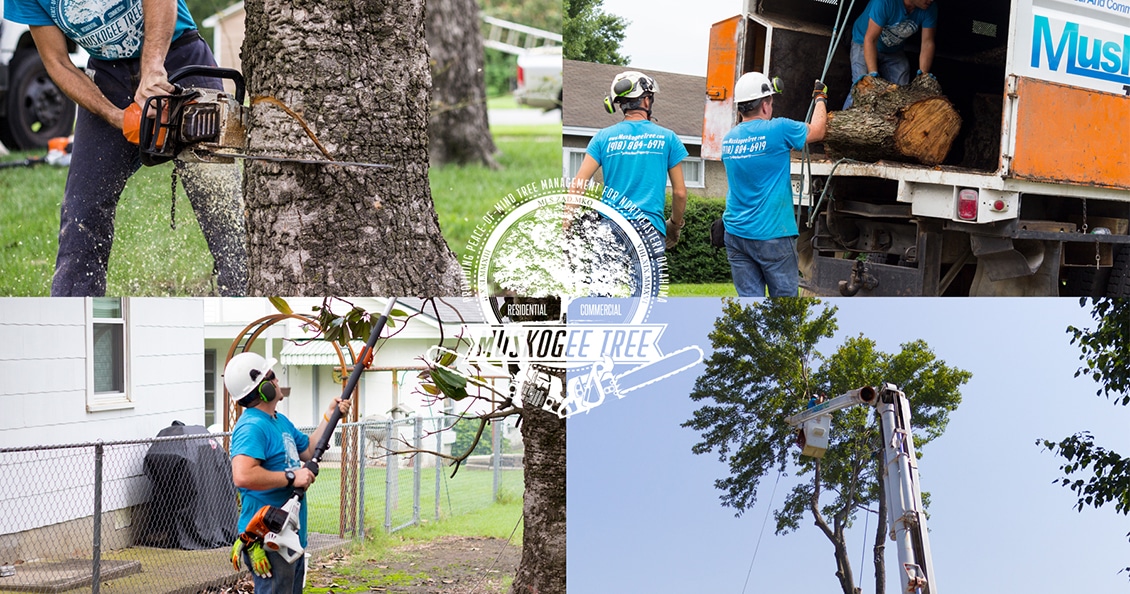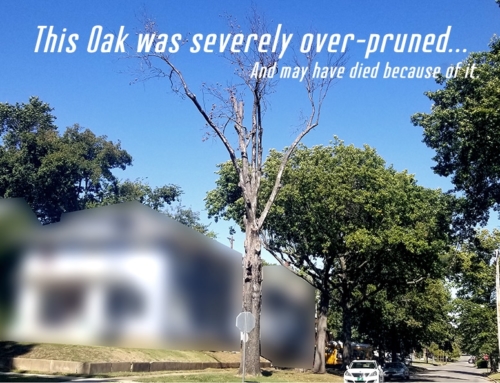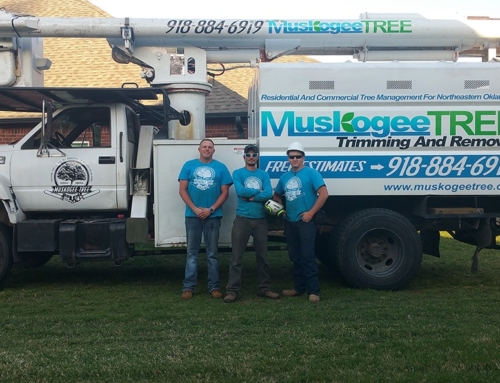What Makes A Tree Care Company?
Every day we see more and more trees that have been damaged by sub-par pruning practices. It’s partially because most states (including Oklahoma) do not require any form of license, training, or experience in order to run a Residential Tree Care Business. Anyone with a few thousand dollars can buy some chainsaws, business cards, and a bucket truck and start cutting up your trees. Unfortunately, knowing how to prune different trees correctly (or when not to prune them at all) takes much more than just an eye for aesthetics and the ability to operate a chainsaw. Professional Tree Care takes real passion. It requires a focus on continued education in the field of Arboriculture, firm adherence to established industry guidelines, and a stalwart commitment to safe work practices.
Unfortunately, business owners in seemingly related fields like Lawn Care, Landscaping, or even Construction, continue to see “Tree Work” as a quick buck or a way to stay busy through their offseason. They invest in the basic equipment needed to do the job and start upselling to their customers. There’s nothing wrong with this in-and-of-itself. Everyone has to start somewhere, and Tree Care is an industry that you learn while doing. But if you’re planning to hire your lawn guy to prune your prized Japanese Maple or to remove the 70 foot Oak hanging over your child’s bedroom, you might want to make sure he’s the real deal. In fact, even the full-time, “trees only” company might just be a guy who was sick of punching a clock and spent his tax return on a bucket truck.
So how can you tell who knows their stuff from someone who just looks the part?
Unfortunately, there’s no easy answer to this question. However, we’ve prepared this list of “must-haves” to help you get started.
Industry Specific General Liability and Worker’s Comp Insurance
Once you’ve requested and received a copy of their Insurance Certificate (directly from their insurance agent, not out of the back of a pickup), call the insurance provider to verify the coverages. Make sure you do this well in advance of signing any contracts.
Ask the Insurance Agent or Provider if the General Liability coverage applies to Tree Removal, Tree Pruning, and Stump Grinding (if applicable to your job). These coverages are not standard with basic GL policies a Lawn or Landscape company would typically hold. It is a separate and unique coverage type.
If you discover that the General Liability Coverage does not apply to Tree Removal and Tree Pruning, or that the Tree Company does not carry Worker’s Compensation – proceed at your own risk. You are not dealing with a Legitimate Tree Care Company. Residential Tree Care is an extremely dangerous profession . General Liability and Worker’s Comp coverages are absolute necessities. Without them, any property damage or crewmember injury will be your responsibility (after the resultant lawsuit is concluded, that is).
Proper Safety Equipment And Jobsite Safety Standards
Personal Protective Equipment (PPE) is not optional for a Legitimate Tree Care Company, there is simply too much danger associated with this Industry.
The American National Standards Institute’s (ANSI) Z133 Safety Guidelines for Tree Care Companies specifies all of the requirements for not only PPE, but all aspects of a jobsite safety. Ask the Tree Care Company representative if their crewmembers will all be wearing ANSI approved Hard Hats, Eye Protection, Hearing Protection, Gloves, and Chainsaw Chaps (when working on the ground).
The answer you receive, and the manner in wich it’s given, should provide you a pretty good idea of how invested they are in safety. If you have any doubts, go online to their Website or Facebook business page. You should be able to find plenty of media (photos / video) showing safe work practices and the aforementioned PPE. Regardless of who you hire, don’t be afraid to expect them to keep their word. If the crew shows up and begins to work without proper PPE, you’ll need to decide how important safety is to you.
Full or Part-Time Employees (Not 1099 Laborers)
This might seem unimportant at first, but in reality there’s an iceberg just beneath this issue. Due to the nature of the relationship between a Tree Care Company owner and the hired help (ground-hands, trimmers, etc.), the State Of Oklahoma considers said help to be “Employees”, and they fully expect to receive employment taxes on their pay. The only exception to this is when those helpers are legitimate independent contractors with their own established businesses, tax-records, and clients. Typically the only people who fall into this category are Contract Climbers and Heavy Equipment Operators.
The costs of hiring an outside payroll company, paying employment taxes, and maintaining Workers Comp insurance are staggering. Because it is “just easier”, many Tree Care Company owners elect to pay their help a “daily” or “weekly” rates, regardless of hours worked, and report them as 1099 Miscellaneous Contractors. This saves time and considerable expense in managing a legitimate payroll system for full or part-time employees. The primary problem with this approach is simple – the State Of Oklahoma consider’s it a form of Tax Evasion.
On top of that issue, however, are the more subtle concerns. Unfortunately, due to the ease of setting up and operating a low-key Tree Care Company in Oklahoma, many out-of-work individuals who can not get work elsewhere due to criminal charges, drug-use, suspended licenses, or probationary obligations see a no-qualification labor job that pays $100 a day as an easy answer. The question this raises is simple : how do you know who is working on your property, and near to your home?
Companies who strive for legitimacy have to pay the additional costs of payroll taxes and workers comp, and they are typically much more careful about how they vet their employees. There’s already an investment of time in hiring them and provided training, and as a result those employees tend to stick around much longer. Though a company like this may have much higher overhead (and higher rates), you can take peace-of-mind in knowing that the crew that shows up at your house isn’t a bunch of guys who just piled in the truck that morning. They will be skilled workers who are learning more about the Tree Industry every day, rather than just someone who needs to pay their rent that month.
A Working Knowledge Of Tree Physiology
If I told you that placing a cut just inches away from the correct location will likely have permanent negative effects on your tree, would I get your attention?
Seems like a silly question, doesn’t it? The sad fact is this : The vast majority of Tree Care Companies in unregulated states like Oklahoma are usually made up of 1 or 2 individuals who decide to start trimming trees for their neighbors, or as an added service for their already established Lawn or Landscaping customers. How much do you expect them to know about Tree Physiology? For example, the average Joe doesn’t know what Epicormic Growth, Codominant Leaders, Bark Inclusions, Apical Dominance, Epiphyte Growth, Biotic vs Abiotic Disorders, or the difference between Angiosperms and Gymnosperms are. What about the interior structure of trees? Do you know how to recognize the signs of Compartmentalization Of Decay?
Probably not. And that’s okay! That’s what we’re here for. But what about the guy who’s about to prune the only tree left in your yard? Do you expect him to know those things? As I mentioned earlier, everyone has to start somewhere. The ability to go from nothing to something is a very basic part of the American Dream, and one of the things that makes our Country great! But more often than not, local “Tree Trimmers” (especially if already running a business that provides other services) just don’t have the time to invest in studying and learning an entire new area of practice. For this reason, we believe that any Company who offers Tree Services (especially Pruning) should be first-and-foremost, A Tree Company. It should be focused primarily on Tree Care, and the Tree Care Industry, and that focus should be readily apparent.
Given how many trees that we see everyday in and around Muskogee that are in decline or have been killed due to improper pruning practices, we are forced to wonder about the level of commitment of the people who pruned them. Be wary of topping, over-pruning, and improper pruning cuts. If you’re having doubts about the qualifications of a Tree Care Company that you plan to hire, ask yourself – “Do I trust this Company to correctly prune my trees?”. After all – the ability to swing a hammer and use a tape measure doesn’t make someone a Carpenter. Would you hire that person to build your house based soley on their ability to use those tools?
Strong References and Customer Satisfaction Ratings
Though this aspect is a bit more subjective than the previous points, a Company’s Online Reviews and Ratings can tell you a great deal about what to expect from that company. Facebook and Google are the two sites where you’re most likely to find an abundance of customer reviews and ratings. If a company has their Ratings/Review page blocked or turned off, there’s probably a good reason, and it might be prudent to look eslewhere. Also, while it’s not always realistic to expect your company of choice to have a perfect 5 star rating, you should certainly expect it to be close. When in doubt, ask any prospective company for direct customer references (names and phone numbers). A company that cares about their reputation and customer satisfaction should have a list of references on hand.





